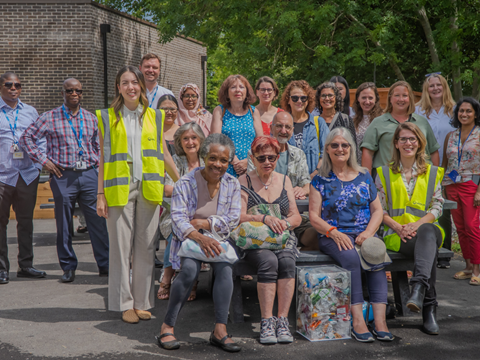
In a project hoped to improve the well-being of local communities, Veolia’s recycling process will transform ‘hundreds of thousands’ of bread bags, crisp packets, and other soft plastics from Tesco into outdoor furniture and equipment for public gardens from the National Health Service (NHS) Property Services.
Reportedly, Veolia’s recycling process can convert difficult-to-recycle soft plastics into decking, benches, tables, and raised beds, among other items. Now it is being used in a programme jointly coordinated by the government-owned health state organization and NHS Property Services and the environmental and community charity Groundwork.
New items generated via the Veolia process will be donated to the NHSPS Social Prescribing Programme, which will establish new gardens in community locations across the UK. Recycled gardening products will be used to introduce nature around health centres, which can then be used by both patients and the local community.
‘Hundreds of thousands’ of soft plastic returned to Tesco stores are set to be incorporated into new equipment and furniture, with a single bench expected to incorporate over 2,500 pieces of soft plastic.
Initially, recycled bread bags, crisp packets, yoghurt tops, and other pieces of soft plastic will be turned into trellising, decking, raised beds, seating, and tables for the John Scott Health Centre in London, owned by NHS Property Services.
However, this is set to form one of 100 hubs and green spaces designed under NHSPS’ social prescribing programme. Further projects are set to take place at Tarleton Health Centre in Preston; Maghull Health Centre in Merseyside, Goscote Hospice in Walsall; Shaw House in St Austell; and Whitby Community Hospital.
Social prescribing hopes to tackle the root causes of poor health and improve general wellbeing, thus addressing social and health issues in a non-clinical way. The contribution of recycled tools and furniture is hoped to help alleviate pressure on the voluntary sector and utilize vacant space in NHSPS’ portfolio to benefit local communities.
“It’s fantastic to see the soft plastic that our customers are returning being turned into something new that will benefit communities and help give young people a stronger start in life,” said Tony McElroy, head of Campaigns at Tesco. “It’s still our absolute priority to remove and reduce as much plastic as possible and make sure everything we use is recycled and kept out of the environment.”
Dr. Min Rodriguez, head of Social Impact at NHSPS, continued: “We are really proud of the impact our social prescribing sites have had on individuals and communities – just between 2022 and 2023 we have reached 60,000 patients.
“This collaboration with Tesco, Veolia and Groundworks highlights the potential of innovative partnerships to not only create vibrant spaces for public benefit but also to drive positive change in healthcare and environmental sustainability. And it’s particularly special that we are repurposing soft plastics instead of increasing waste.”
According to Graham Duxbury, UK chief executive at Groundwork, “this is a great example of innovative thinking to minimize plastic waste while improving much needed open spaces in local communities. We’re proud to be playing our part in delivering this project with the sustainable design expertise and nature-based solutions brought by our Landscape Architects and look forward to seeing the benefits it brings to communities and the environment.”
Adam Wylie, managing director - Commercial, at Veolia, stated: “It’s great to be working on this unique project which brings together three of our partners: Tesco, one of our most innovative partnerships that is bolstering the circular economy; with the NHS in providing energy, decarbonization and resource management solutions; and Groundwork as our charity partner and with whom we have delivered ambitious social value campaigns across the country to support the local communities we serve every day.
“Utilizing recycled materials in green spaces and collaborating across private and public bodies to deliver these social prescribing gardens is a testament to how we can and must all work together to deliver ecological transformation.”
A similar project took place in 2022, when Veolia joined forces with Miracle-Gro and Dobbies Garden Centres to collect low-density polyethylene bags and reprocess them into garden furniture, plastic films, and new bags. It sought to divert an estimated 40 million bags from landfill and save 22,000 tonnes of CO2 every year when scaled up nationally.
Other efforts to breathe new life into Tesco’s soft plastic packaging include its previous partnership with Berry Global, in which the waste was recycled into pellets to be used in bin liners. The retailer planned to send 25 tonnes of bread bags, fruit, vegetable, and salad packaging, and other soft plastics to Berry per month, and the recyclate was set to be combined with recovered agricultural films to ensure their durability.
In the same year, soft plastics sourced from Tesco’s in-store collection points were converted into snap pots for Heinz Beanz in partnership with Berry Global, Plastic Energy, and SABIC. The pots would contain 39% recycled plastic and could apparently be recycled at kerbside at end-of-life.
If you liked this story, you might also enjoy:
How are the top brands progressing on packaging sustainability?
Sustainable Innovation Report 2024: Current trends and future priorities
Reuse vs. single use – which is better for the environment?
The ultimate guide to global plastic sustainability regulation


















No comments yet